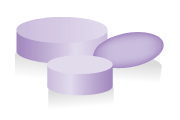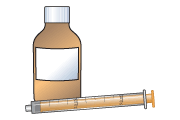Baclofen for muscle spasm and dystonia
This leaflet is for parents and carers about how to use this medicine in children. Our information may differ from that provided by the manufacturers, because their information usually relates to adults. Read this leaflet carefully. Keep it somewhere safe so that you can read it again.
Do not stop giving Baclofen suddenly, as your child is likely to get withdrawal symptoms
Name of medicine
Baclofen
Why is it important for my child to take Baclofen?
Baclofen helps your child’s muscles to relax, making it easier and less painful for them to move. Baclofen may also help to reduce muscle pain.
Children with dystonia can get painful and distressing movements and muscle spasms, causing difficulty with sitting, standing and moving difficult. Baclofen acts in the brain to slow down messages to the muscles and nerves. This reduces muscle stiffness and improves comfort.
What is Baclofen available as?
Tablets: 10 mg
Liquid Medicine: 5 mg or 10 mg in 5 mL
When you get a new bottle of liquid medicine, check what strength it is and how much to give (the dose).
When should I give Baclofen
Baclofen is usually given three or four times a day.
- Three times a day: This should be in the morning, early afternoon and at bedtime. Ideally, these times are at least 6 hours apart, for example 8am, 2pm and 8pm.
- Four times a day: This is usually first thing in the morning, at about midday, late in the afternoon and at bedtime. Ideally, these times should be at least 4 hours apart, for example 8am, midday, 4pm and 8pm.
Try to give the medicine(s) at about the same times each day, to help you remember.
It is important that you follow your doctor’s instructions.
How much should I give?
Your doctor will work out the amount of medicine (the dose) that is right for your child. The dose will be shown on the medicine label.
When you first start giving baclofen to your child, you may give them a low dose to start with and then increase the dose bit by bit over a few days or weeks. This helps your child to get used to the medicine. Your doctor will explain what to do.
It is important that you follow your doctor’s instructions about how much to give.
How should I give Baclofen?

Tablets
Baclofen should be taken with or just after food
Your doctor may have told you to give half or quarter of a tablet.
Tablets (or part tablets) should be swallowed with a glass of water, juice or squash. Your child should not chew the tablet or part tablet.

Liquid medicine
Measure out the right amount using a medicine spoon or oral syringe. You can get these from your pharmacist. Do not use a kitchen teaspoon as it will not give the right amount.
When should the medicine start working?
Baclofen starts to work straight away and your child’s muscles should begin to feel less stiff after taking baclofen regularly for 3–4 days. However, it may take up to 2 weeks or longer for the full effect to be felt, because the amount of medicine has to be increased slowly.
What if my child is sick (vomits)?
If your child is sick less than 30 minutes after having a dose of Baclofen, give them the same dose again.
If your child is sick more than 30 minutes after having a dose of Baclofen, you do not need to give them another dose. Wait until the next normal dose.
What if I forget to give it?
If you forget to give a dose, your child’s muscles may become a little stiffer. Give the dose as soon as you remember. Wait at least 4 hours before giving the next dose.
Never give a double dose of Baclofen.
What if I give too much?
If your child has a seizure (fit or convulsion), is very sleepy or difficult to wake up, or has difficulty sleeping, they may have had too much baclofen. Take them to hospital straight away. Take the medicine container or packaging with you, even if it is empty. This will be useful to the doctor. Have the medicine or packaging with you if you telephone for advice.
It can be dangerous to give too much Baclofen.
If your child has a seizure (fit or convulsion), is very sleepy or difficult to wake up, or has difficulty sleeping, they may have had too much Baclofen. Take them to hospital straight away. Take the medicine container or packaging with you, even if it is empty. This will be useful to the doctor. Have the medicine or packaging with you if you telephone for advice.
Are there any possible side effects?
We use medicines to make our children better, but sometimes they have other effects that we don’t want (side effects).
Side effects you must do something about
If your child has a seizure (also called a fit or convulsion) or is very sleepy or difficult to wake up, they may have had too much Baclofen. Take them to hospital straight away.
If your child has difficulty breathing, take them to hospital straight away. Tell the doctor that your child is taking Baclofen. Take the medicine or packaging with you.
- If your child is confused, can’t sleep or has nightmares, or seems anxious or shaky, contact your doctor.
If your child’s muscles become floppy (hypotonic), contact your doctor, as you may need to give less baclofen.
Your child may have difficulty passing urine (having a wee). If they cannot pass urine, contact your doctor for advice.
Other side-effects you need to know about
Your child may be more sleepy than usual.
Your child may feel sick (nausea) or be sick (vomit).
Your child may feel light-headed or dizzy when they stand up, or may faint. Encourage them to stand up slowly, and to sit or lie down if they feel dizzy or lightheaded. If this happens often, contact your doctor to check your child’s blood pressure, as it may be too low.
There may sometimes be other side effects that are not listed above. If you notice anything unusual and are concerned, contact your doctor. You can report any suspected side effects to a UK safety scheme at mhra.gov.uk/yellowcard
More information on side-effects can be found in a leaflet on our website.
Can other medicines be given at the same time as Baclofen?
Check with your doctor or pharmacist before giving any other medicines to your child. This includes herbal and complementary medicines.
- You can give your child medicines that contain paracetamol or ibuprofen, unless your doctor has told you not to.
Baclofen should not be taken with some medicines that you get on prescription. It is important to tell your doctor and pharmacist about any other medicines your child is taking before starting Baclofen.
Is there anything else I need to know about this medicine?
When you get a new bottle of liquid medicine, check what strength you have been given and how much to give your child, as this may be different from the previous supply. If you are not sure how much to give, contact your doctor, pharmacist or nurse.
Do not suddenly stop giving Baclofen to your child, as they may get withdrawal symptoms.
If your doctor decides to stop Baclofen, they will discuss this with you. You will usually reduce the dose slowly to make sure your child doesn’t get withdrawal symptoms.
If you or your child want to stop this medicine, discuss this with your doctor. Do not change the dose without talking to your doctor first.
You may need to order Baclofen tablets or liquid medicine specially from your pharmacy. Make sure you do this in plenty of time so that you don’t run out.
General advice about medicines
- Try to give medicines at about the same times each day, to help you remember.
- Only give this medicine to your child. Never give it to anyone else, even if their condition appears to be the same, as this could do harm.
- If you think someone else may have taken the medicine, contact a doctor straight away.
- Make sure that you always have enough medicine. Order a new prescription at least 2 weeks before you will run out.
- Make sure that the medicines you have at home have not reached the ‘use by’ date on the packaging. Give old medicines to your pharmacist to dispose of.
- If you are not sure a medicine is working, contact your doctor but continue to give the medicine as usual in the meantime. Do not give extra doses, as you may do harm.
Where should I keep this medicine?
- Make sure that children cannot see or reach the medicine.
- Keep the medicine in a cupboard, away from heat and direct sunlight.
- Do not keep the liquid medicine in the fridge.
- Keep the medicine in the container and packaging it came in.
Who to contact for more information?
Your doctor, pharmacist or physiotherapist will be able to give you more information about Baclofen and about other medicines used to treat muscle spasticity.
England: NHS 111
Tel 111
www.nhs.ukScotland: NHS 24
Tel 111
www.nhs24.scotNorthern Ireland: NI Direct
Wales: NHS 111 Wales
Tel 111
www.111.wales.nhs.ukDystonia UK
020 7793 3651
www.dystonia.org.uk/Copyright disclaimer
Version [2]. © NPPG, RCPCH and WellChild, all rights reserved. Review by October 2027.
The primary source for the information in this leaflet is the British National Formulary for Children. For details on any other sources used for this leaflet, please contact us through our website, www.medicinesforchildren.org.uk.
We take great care to make sure that the information in this leaflet is correct and up-to-date. However, medicines can be used in different ways for different patients. It is important that you ask the advice of your doctor or pharmacist if you are not sure about something. This leaflet is about the use of these medicines in the UK, and may not apply to other countries. The Royal College of Paediatrics and Child Health (RCPCH), the Neonatal and Paediatric Pharmacists Group (NPPG), WellChild and the contributors and editors cannot be held responsible for the accuracy of information, omissions of information, or any actions that may be taken as a consequence of reading this leaflet.
